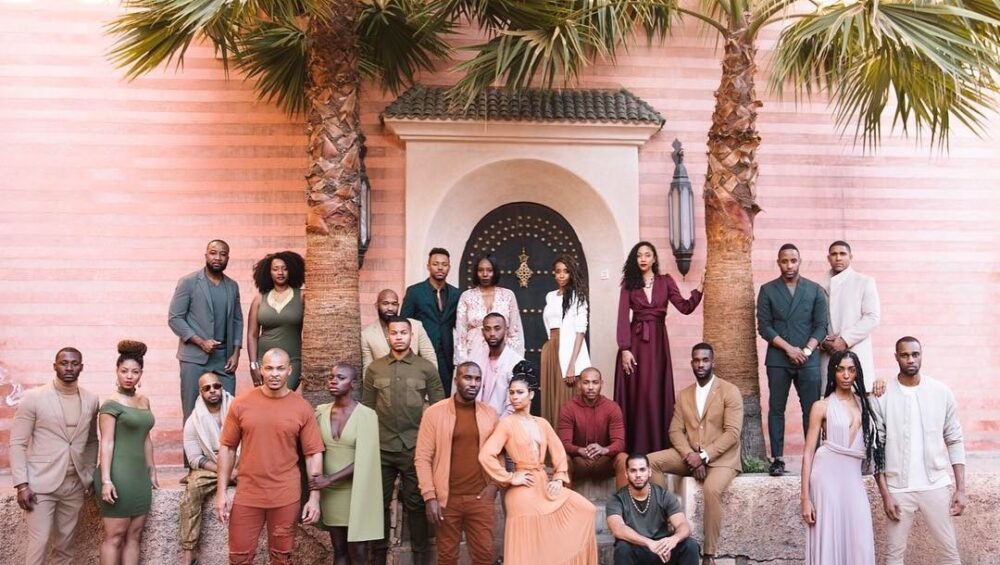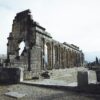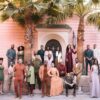If you’re a Black traveler in Morocco or you’re just planing a visit to this magnificient country, we’ve got you covered with some essential travel tips. Morocco offers a culturally rich and diverse experience, and with a little preparation, you can make the most of your trip. From understanding Moroccan society to navigating interactions, we’ll provide you with insights and advice to ensure a safe, enjoyable, and enriching journey.
Key Takeaways:
- Research and respect Moroccan culture and customs to enhance your cultural awareness.
- Be mindful of the appropriate dress code to show cultural sensitivity while expressing your personal style.
- Prepare for potential language barriers and engage in respectful communication during interactions.
- Prioritize your safety by following practical security measures for a smooth journey.
- Explore Morocco’s hidden gems to discover unique off-the-beaten-path experiences.
Understanding Moroccan Culture and Society
As an enchanting destination known for its captivating landscapes and vibrant cities, Morocco offers a fascinating blend of traditions, values, and customs that shape its unique culture and society. For Black travelers visiting this North African gem, understanding the essence of Moroccan culture can greatly enhance the experience and foster meaningful connections with the local community.
At the heart of Moroccan culture is the appreciation for hospitality and unity. Moroccans are renowned for their warm welcomes and genuine generosity, making visitors feel right at home. From sipping traditional mint tea to indulging in mouthwatering tagines, embracing the local customs and cuisine allows travelers to truly immerse themselves in the Moroccan way of life.
“Morocco’s rich cultural heritage is steeped in a history that dates back centuries. The cultural mosaic is a result of influences from various civilizations, including Arabic, Berber, and French. This diversity and fusion of traditions contribute to the vibrant tapestry that defines Moroccan society.”
Exploring Moroccan medinas, such as Marrakech’s iconic Djemaa el-Fna, provides a glimpse into the bustling markets, artistic craftsmanship, and lively street performances, offering an authentic immersion into the daily life of locals. Additionally, visiting historic sites like the ancient Roman ruins of Volubilis or the royal city of Fes showcases Morocco’s rich historical heritage, offering a deeper understanding of the country’s past and present.
Moroccan society is deeply rooted in Islamic and Berber influences, which are reflected in its architecture, art, and religious practices. Mosques with intricate geometric designs, vibrant zellige tiles, and mesmerizing calligraphy are testaments to the artistic prowess and spiritual devotion of the Moroccan people. Respect for these cultural and religious symbols is paramount, ensuring that travelers honor the traditions and beliefs held dear by the local community.
In addition to the vibrant urban centers, venturing into the Atlas Mountains or the Sahara Desert reveals a different facet of Moroccan culture and society. Interacting with indigenous Berber communities offers insights into their deep connection with the land, their traditional clothing, and their age-old customs. An overnight stay in a traditional desert camp provides a chance to witness the mesmerizing starry skies and be serenaded by Berber musicians, creating unforgettable memories.
Festivals and Celebrations
Morocco’s cultural fabric is interwoven with a rich tapestry of festivals and celebrations, showcasing the country’s deep-rooted traditions and vibrant joie de vivre. The annual Moussem of Tan-Tan, the colorful Imilchil Marriage Festival, and the spiritual Gnawa World Music Festival are just a few examples of the diverse festivities that grace the Moroccan calendar. Attending these celebrations allows travelers to witness the joyous spirit of the Moroccan people and partake in age-old rituals that have been passed down through generations.
| Festival | Location | Description |
|---|---|---|
| Marrakech International Film Festival | Marrakech | One of the most prestigious film festivals in Africa, showcasing world-renowned films and celebrating the art of cinema. |
| Tan-Tan Moussem | Tan-Tan | A traditional gathering of indigenous tribes from the southern regions of Morocco, featuring music, dance, and camel races. |
| Fez Festival of World Sacred Music | Fes | A unique celebration of spiritual music from around the world, bringing together artists and audiences for transcendent performances. |
By exploring the diverse festivals and celebrations across Morocco, Black travelers can engage with Moroccan culture on a deeper level, fostering connections and understanding the different facets of this captivating society.
Dress Code and Cultural Sensitivity
When visiting Morocco, it is important to be aware of the dress code and cultural sensitivity considerations. The way you dress can have a significant impact on how you are perceived by locals and can determine the level of respect and acceptance you receive.
The traditional dress code in Morocco is influenced by Islamic customs and traditions. While there is no strict enforcement of dress regulations, it is advisable to dress modestly, particularly in public and religious spaces. This applies to both men and women.
Dress Code for Women
For women, it is recommended to wear loose-fitting clothing that covers the shoulders, chest, and knees. Long skirts or loose pants paired with tops that cover the upper arms are appropriate. It is also advisable to carry a scarf or pashmina to cover your head and shoulders when entering mosques or other religious sites.
One’s attire speaks volumes about their cultural sensitivity and respect for local customs. By dressing modestly and adhering to the local dress code, you not only show respect to the Moroccan culture but also enhance your overall travel experience.
Dress Code for Men
Men should also dress modestly, wearing long pants and shirts that cover the shoulders. T-shirts, polo shirts, or button-up shirts paired with pants are considered appropriate. It is important to note that sleeveless shirts or shorts may not be well-received in more conservative areas.
When visiting more rural or traditional regions, such as the Sahara desert or small villages, it is advisable to dress even more conservatively. Wearing long skirts or dresses for women and traditional Moroccan attire, such as a djellaba or caftan, for men can help you blend in with the local culture and show respect for their traditions.
Cultural Sensitivity
In addition to the dress code, it is crucial to be culturally sensitive throughout your visit to Morocco. Respect the local customs and traditions, and be mindful of your behavior to avoid inadvertently causing offense. Here are a few key points to keep in mind:
- Always ask for permission before taking photos of individuals, especially in more rural or conservative areas.
- Avoid public displays of affection, as they may be considered inappropriate.
- Remove your shoes when entering someone’s home or a mosque.
- Do not point with your finger; instead, use an open hand or gesture with your chin.
- Avoid discussing sensitive topics such as politics or religion.
- Learn a few basic Arabic phrases or greetings, as locals appreciate the effort to communicate in their language.
- Be aware of the concept of personal space, as Moroccans may stand closer during conversations than what you are accustomed to.
By following these guidelines and being culturally sensitive, you will not only show respect for the Moroccan culture but also enhance your interactions and experiences during your visit.
| Dos | Don’ts |
|---|---|
| Do dress modestly, especially in public and religious spaces. | Don’t wear revealing or tight-fitting clothing. |
| Do ask for permission before taking photos of individuals. | Don’t take photos without consent, especially in more conservative areas. |
| Do remove your shoes when entering someone’s home or a mosque. | Don’t wear shoes indoors or in religious spaces. |
| Do learn a few basic Arabic phrases or greetings. | Don’t assume everyone speaks English. |
| Do be respectful and mindful of local customs and traditions. | Don’t engage in public displays of affection. |
Navigating Interactions and Stereotypes
When traveling as a Black individual in Morocco, it’s important to be mindful of navigating interactions with locals and addressing potential stereotypes. By understanding the cultural context and employing respectful communication, you can foster positive connections and break down misconceptions.
Cultural Awareness and Language Barriers
One of the key aspects of navigating interactions in Morocco is to be culturally aware. Familiarize yourself with Moroccan customs, greetings, and etiquette. It’s always appreciated when travelers make an effort to learn basic phrases of the local language, such as greetings and simple expressions. This shows respect and can enhance your ability to engage with locals on a deeper level.
While English is widely spoken in popular tourist areas, it’s beneficial to know that French and Arabic are the predominant languages. Having a basic understanding of these languages can help bridge any communication gaps and express your interest in the local culture.
Experiencing Cultural Exchanges
Morocco is a country rich in traditions and unique cultural experiences. Embrace opportunities to engage in cultural exchanges with locals. Participating in traditional activities such as henna painting, tea ceremonies, or cooking classes can provide meaningful interactions and foster a deeper understanding of Moroccan customs.
Addressing Stereotypes with Respect
It’s unfortunate that stereotypes exist in every society, and Morocco is no exception. As a Black traveler, it’s important to approach conversations about race and social issues with sensitivity. Engage in open dialogue, share your experiences, and offer perspectives that challenge stereotypes. By fostering understanding and dispelling misconceptions, you can contribute to positive change and create a more inclusive travel experience for future visitors.
“By fostering understanding and dispelling misconceptions, you can contribute to positive change and create a more inclusive travel experience for future visitors.”
Tips for Respectful Communication
When interacting with locals, it’s crucial to approach conversations with respect and cultural sensitivity. Here are some tips to keep in mind:
- Listen and Learn: Be receptive to different viewpoints and take the time to understand the perspectives of others.
- Be Open-minded: Embrace the diversity you encounter and celebrate the differences that make each person unique.
- Empathy and Humility: Approach interactions with empathy, seeking to understand different experiences and challenges.
- Nonverbal Communication: Pay attention to nonverbal cues and body language. Respect personal space and use appropriate gestures.
- Respectful Curiosity: Inquire about local customs and traditions with genuine interest and respect for the answers you receive.
By navigating interactions and addressing stereotypes with respect and curiosity, you can forge meaningful connections and contribute to a more inclusive travel experience in Morocco.
| Tips for Navigating Interactions and Stereotypes | Benefits |
|---|---|
| Be culturally aware | – Create positive connections with locals – Enhance understanding of Moroccan customs |
| Learn basic local language | – Bridge communication gaps – Show respect and interest in the culture |
| Engage in cultural exchanges | – Foster deeper connections with locals – Gain insights into Moroccan traditions |
| Address stereotypes with respect | – Contribute to positive change – Promote inclusivity and understanding |
| Practice respectful communication | – Forge meaningful connections – Enhance cultural exchange |
Safety and Security Measures
Ensuring the safety of all travelers is a top priority. When it comes to Black travelers visiting Morocco, there are specific safety considerations that can help ensure a smooth and secure journey throughout the country.
Safety Tips for Black Travelers in Morocco
1. Be aware of your surroundings: It’s important to stay vigilant and aware of your surroundings at all times. Keep track of your belongings and avoid displaying expensive items in public.
2. Research your accommodation: Prior to your trip, research and choose accommodations that have positive reviews and are known for their safety measures.
3. Stay connected: Make sure to have access to a reliable means of communication, such as a local SIM card or international roaming, to stay connected with your loved ones and to easily reach out for help if needed.
4. Follow local laws and regulations: Familiarize yourself with the local laws and customs of Morocco to avoid any misunderstandings and ensure a respectful experience.
5. Use trusted transportation options: Stick to licensed taxis or reputable ride-sharing services to ensure your safety during travel within the country.
6. Travel in groups or with a trusted companion: When exploring unfamiliar areas, it’s always a good idea to travel in groups or with a trusted companion for added security.
Security Measures for Black Travelers in Morocco
1. Keep important documents secure: Make copies of your passport, identification, and travel insurance documents and keep them separate from the originals. This can help speed up the process in case of loss or theft.
2. Inform someone of your travel plans: Share your itinerary and contact information with a trusted friend or family member back home. Regularly update them on your whereabouts.
3. Register with your embassy/consulate: If your country has an embassy or consulate in Morocco. Consider registering with them so they can provide assistance in case of emergencies.
4. Stay informed about local conditions: Stay updated on local news and government travel advisories to stay informed about any potential safety concerns or disruptions.
5. Trust your instincts: If a situation feels uncomfortable or unsafe, trust your instincts and remove yourself from the situation immediately.
By following these safety tips and security measures, Black travelers can have a worry-free experience while exploring the beauty and culture of Morocco.
Exploring Morocco’s Hidden Gems
Morocco is a country that never fails to captivate with its breathtaking landscapes and vibrant cities. While popular tourist destinations like Marrakech and Fez offer incredible experiences, there are also hidden gems waiting to be discovered. For those who seek unique and off the beaten path adventures, Morocco has plenty to offer.
One such hidden gem is the charming coastal town of Essaouira. Located on the Atlantic coast, Essaouira is known for its picturesque blue and white architecture, bustling medina, and beautiful sandy beaches. It’s a haven for water sports enthusiasts, with opportunities for windsurfing and kiteboarding. Strolling through the narrow alleys of the medina, visitors can explore local shops and sample delicious fresh seafood at the bustling harbor.
If you’re looking for a taste of traditional Berber culture, a visit to the Atlas Mountains is a must. Venture off the beaten path and discover ancient villages nestled among the rugged peaks. Immerse yourself in the local way of life, trek through scenic trails, and marvel at breathtaking views. Don’t miss the opportunity to spend a night in a traditional Berber homestay, where you can savor traditional cuisine and experience the warmth and hospitality of the locals.
“Exploring the hidden gems of Morocco has been one of the most rewarding experiences of my travels. From the stunning oasis of the Draa Valley to the ancient ruins of Volubilis, there is a wealth of unique and authentic experiences waiting to be discovered.”
– Traveler’s testimony
If you’re seeking tranquility and natural beauty, head to the coastal town of Mirleft. This hidden gem is known for its pristine beaches, towering cliffs, and laid-back atmosphere. Enjoy long walks along the shore, indulge in fresh seafood at local restaurants, and take in the stunning sunsets that paint the sky in vibrant hues.
For history enthusiasts, a visit to the Roman ruins of Volubilis is a must. Located near the city of Meknes, Volubilis offers a fascinating glimpse into Morocco’s ancient past. Explore the well-preserved ruins, admire intricate mosaics, and imagine the grandeur of the Roman Empire in this UNESCO World Heritage site.
In the southern region of Morocco lies the Draa Valley, an oasis of palm groves, ancient villages, and captivating desert landscapes. Take a scenic drive along the Draa River, explore the local kasbahs, and immerse yourself in the rich Berber culture. This hidden gem offers a peaceful escape from the bustling cities, allowing you to connect with nature and experience the timeless beauty of the desert.
| Hidden Gem | Description |
|---|---|
| Essaouira | A coastal town known for its blue and white architecture, bustling medina, and water sports opportunities. |
| Atlas Mountains | A mountainous region offering breathtaking landscapes, traditional Berber villages, and unparalleled trekking experiences. |
| Mirleft | A coastal town renowned for its pristine beaches, stunning cliffs, and peaceful atmosphere. |
| Volubilis | Ancient Roman ruins near Meknes showcasing well-preserved structures and intricate mosaics. |
| Draa Valley | An oasis of palm groves, ancient villages, and desert landscapes, offering a serene and authentic Moroccan experience. |
These hidden gems in Morocco provide a unique and authentic journey off the beaten path. Whether you’re a nature lover, history enthusiast, or simply seeking tranquility. Exploring these lesser-known attractions will leave you with unforgettable memories of this captivating country.
Conclusion
Throughout this article, we have explored essential travel tips for Black travelers visiting Morocco. By embracing cultural awareness and respect, you can ensure a memorable and enjoyable trip in this vibrant country.
Understanding Moroccan culture and society is crucial for a deeper appreciation of the destination. From the rich history to the warm hospitality, immersing yourself in the local customs will enhance your experience.
Respecting the dress code and cultural sensitivities is paramount. By dressing modestly and adhering to local customs, you can navigate any cultural barriers while remaining true to your personal style.
When interacting with locals, embrace open-mindedness and genuine curiosity. This allows for meaningful cultural exchanges and helps dispel any potential stereotypes.
While safety is a priority for all travelers, it is essential to be aware of specific considerations for Black travelers in Morocco. By staying informed and using common sense, you can ensure a secure journey.
And finally, don’t be afraid to explore hidden gems off the beaten path. Morocco offers breathtaking landscapes and unique experiences that can be discovered by venturing beyond the popular tourist sites.
Remember, embracing cultural awareness, respect, and a proactive approach will pave the way for an enriching and enjoyable trip as a Black traveler in Morocco. Bon voyage!
FAQ
Are there any specific travel tips for Black travelers visiting Morocco?
Yes, here are some essential travel tips specifically tailored for Black travelers visiting Morocco to ensure a welcoming and enriching experience.
What should I know as a Black traveler about Moroccan culture and society?
Understanding the rich cultural and societal aspects of Morocco will provide valuable insights and context for your trip. Here’s what you need to know.
Is there a dress code I should follow as a Black traveler in Morocco?
Yes, respecting the appropriate dress code and cultural sensitivity is important in Morocco. We provide guidance on how to navigate this aspect while maintaining individual comfort and expression.
How can I navigate interactions and address potential stereotypes as a Black traveler in Morocco?
Navigating interactions with locals and addressing stereotypes is crucial. We discuss tips for language barriers, cultural exchanges, and respectful communication to help you have a positive experience.
What safety and security measures should I take as a Black traveler in Morocco?
Safety is paramount while traveling. This section offers practical advice and security measures specifically for Black travelers to ensure a smooth and secure journey throughout the country.
Are there any hidden gems or off-the-beaten-path destinations in Morocco that I should explore?
Absolutely! Morocco has several lesser-known attractions and hidden gems. We highlight some of these unique and authentic experiences for you to discover.




